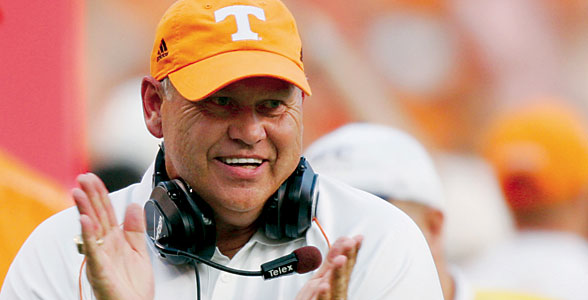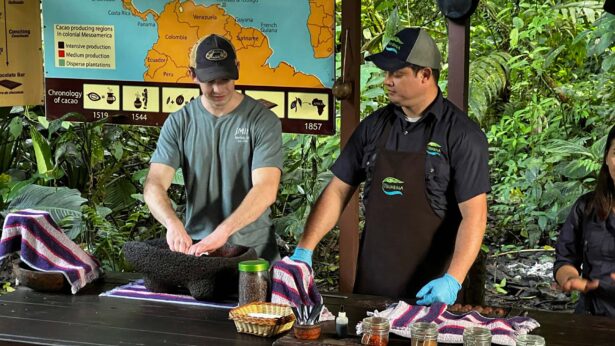By John Painter
It probably had to do with winning college football’s national championship. Things like that tend to make an impression. But sometime in the late 1990s, Phillip Fulmer (Knoxville ’72) became synonymous with the Tennessee Volunteers.
The very mention of his name and listeners or readers immediately thought Tennessee.
As in, “Yes, Phillip Fulmer coaches the Tennessee Vols and they won the BCS national championship and always are on TV and his daughters run off the field with him after every game and, well, he’s Tennessee. He is Tennessee.”
Fulmer obviously wasn’t alone in that distinction. UT fans would place Peyton Manning in that category, although the guess now is that Manning is known nationally more for his Indianapolis Colts success and Super Bowl victory than for his days at Neyland Stadium.
Lady Vols Coach Pat Summitt meets the criteria and has become one of college basketball’s true icons. Eight national championships carry a great deal of exposure, and Summitt never fails to put a class product on the floor.
But Fulmer was UT on its biggest sporting stage, a venue that seats more than 100,000 fans on fall Saturdays. Home games or away games meant massive crowds and mind-numbing media scrutiny.
Fulmer was the face of the Tennessee Vols. That meant whether it was during a nail-biter against Georgia or during a Big Orange Caravan stop in Germantown, Fulmer was the one Vols fans wanted to see.
But now he’s gone, stepping down after 17 seasons at the helm. His final game at Neyland Stadium on November 29, 2008, was a 28–10 triumph over Kentucky—the Vols’ 24th straight victory over the Wildcats. A fine football moment indeed, but just one of the great memories Fulmer served up for Vol fans.
Thanks for that 34–31 win at Georgia in 1992, your first road triumph. You broke out the white pants away from home for the first time in 10 years and started a winning streak against the Bulldogs that lasted the rest of the decade.
Thanks for your very first bowl game victory over Boston College in January 1993. Tampa’s Hall of Fame Bowl—now the Outback—was the setting as Tennessee and quarterback Heath Shuler breezed to a 38–23 triumph. Tampa also marked your final bowl appearance, a 21–17 win over Wisconsin in January 2008.
Thanks for all the miraculous finishes. Rick Clausen rallying UT from 21–0 down on a Monday night at LSU in 2005 to win in overtime might have been the most impressive.
Other great come-from-behind wins in UT football history also occurred on your watch—18 down against Arkansas in 1998; 21 at Kentucky in 2001; 24 at Notre Dame in 1991 (when you were offensive coordinator); and 25 against Vanderbilt in 1987 (when you coached the offensive line). And though not among the top five, coming from 24–7 down at Georgia in 2006 to win 51–33, and rallying last season for the biggest fourth-quarter comeback in Neyland Stadium history to clip Vanderbilt 25–24, after trailing 24–9, are games that will go down in the annals of UT football lore.
Thanks for closing out the artificial turf era on Shields-Watkins Field with a 62–14 thumping of Vanderbilt. The Vols ended with a record of 125-38-7 at home on artificial turf, and your mark as head coach was a perfect 9–0.
Thanks for recruiting an amazing cast of footballers to UT in the spring of 1994. Names such as Jeff Coleman, Jeff Hall, Mercedes Hamilton, Steve Johnson, and Jarvis Reado were all future starters for the 1998 national championship team. Oh, and that Manning guy mentioned earlier played a down or two in the seasons prior, as did starters Terry Fair, Cory Gaines, Ron Green, and Marcus Nash before leaving Big Orange Country. Out of the 22 signees in February 1994, Manning was selected All-America, five others made All-SEC, and seven were chosen in future NFL drafts, including Manning and Fair in the 1998 first round. Such hauls helped cement your status as one of the nation’s top recruiters and made Neyland Stadium a destination of choice for top high-school talent.
Thanks for compiling that 45–5 record from 1995–98, culminating in the very first Bowl Championship Series title.
Thanks for patching those gaping holes in the 1998 lineup and guiding that team through a scheduling gauntlet, one that included seven ranked opponents at the time you played them and four teams ranked among the elite top 10.
The entire 1998 season was highlighted by the development of unsung quarterback Tee Martin, successful replacement of injured all-star tailback Jamal Lewis, a relentless defense led by Al Wilson that routinely came through with tide-turning big plays, and a field-goal kicker in Hall whose heroics salvaged victory in the first two games.
Coach-of-the-year honors cascaded one upon another into your trophy case, culminating in the Eddie Robinson National Coach of Distinction Award.
Thanks for the gutsy fourth-down calls. Like that steamy November Saturday in Miami when the Vols went for broke just before halftime and Derrick Tinsley swept around right end. You said leaving the field, “We came down here to win a football game!” Tinsley scored the afternoon’s only touchdown in a 10–6 victory that ended the Hurricanes’ 26-game home winning streak.
Thanks for the 2001 season. No, it didn’t end the way everyone would have liked, with an SEC championship and a berth in another BCS national title game. But still it was a heck of a ride. Gritty wins that year over Arkansas, LSU, Alabama, South Carolina, and Notre Dame—not to mention rallying from a 21-point deficit at Kentucky—only set the stage for a spectacular night in Gainesville. The Vols prevailed in a top-five showdown, defeating the Gators 34–32 after entering the game more than two-touchdown underdogs. LSU won the rematch one week later in Atlanta, but a bowl win over Michigan—the first meeting between these traditional powers—capped an 11–2 campaign that saw the Vols finish fourth in the AP poll.
Thanks for the overtime experiences. It took six extra periods to topple Arkansas in 2002, five for the win at Alabama in 2003, and four more at Kentucky in 2007 to clinch the SEC Eastern Division title. You became a master motivator when the ball was placed at the 25-yard line, winning six straight OT games from 2002–07.
Thanks for believing in America’s youth. Tennessee began the 2004 season with a pair of true freshman quarterbacks in Brent Schaeffer and Erik Ainge. The results were an appearance in the SEC Championship Game, a smashing Cotton Bowl victory, and a 10–3 finish.
Thanks for the great run against Alabama. An 11–5 career coaching record versus the Crimson Tide is no small accomplishment. Even sweeter was becoming the first school and head coach in history to post seven consecutive wins over Alabama (1995–2001).
And finally, thanks for the pageantry of the SEC Championship Game. The Vols have played five times in the league’s premier event, all with Phillip Fulmer patrolling the sideline. You won two nail-biters and lost three heartbreakers, but over the final decade of your tenure you never went more than 3 years without taking a team to Atlanta.
Welcome, Lane Kiffin
 Lane Kiffin, former head coach of the Oakland Raiders and former offensive coordinator at the University of Southern California, has joined the Vols as the 21st head football coach in UT history.
Lane Kiffin, former head coach of the Oakland Raiders and former offensive coordinator at the University of Southern California, has joined the Vols as the 21st head football coach in UT history.
In Kiffin’s 3 years as recruiting coordinator at USC, the Trojans had the top-ranked recruiting class in college football each year. He was named one of the nation’s top 25 recruiters and as offensive coordinator guided the Trojans to first place nationally in total offense.
Kiffin began his coaching career at his alma mater, Fresno State, working with quarterbacks and wide receivers from 1997 to 1998. He was an assistant at Colorado State in 1999, and made his first stop in the NFL with the Jacksonville Jaguars in 2000.
He was a quarterback at Fresno State for three seasons (1994–96) and earned a bachelor’s degree there in 1998. A native of Bloomington, Minnesota, Kiffin is married to Layla Reaves Kiffin. They have three children.



